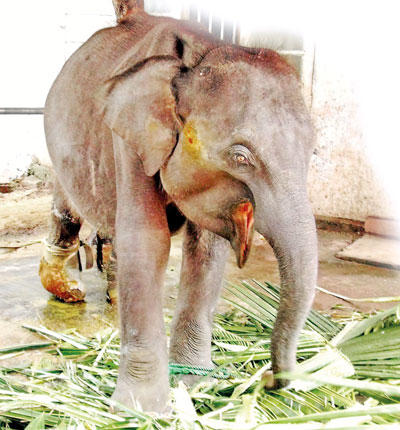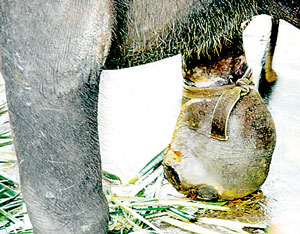Reply To:
Name - Reply Comment
.jpg)
 Recently Sri Lanka paved the way for discussion on many elephant-related matters. The most-discussed issue was the human-elephant conflict. But as many environmental conservationists point out there is a serious issue of elephant smuggling in Sri Lanka. Loopholes in the law and negligence of officials have made the situation grave.
Recently Sri Lanka paved the way for discussion on many elephant-related matters. The most-discussed issue was the human-elephant conflict. But as many environmental conservationists point out there is a serious issue of elephant smuggling in Sri Lanka. Loopholes in the law and negligence of officials have made the situation grave.
Elephants cannot be domesticatedThe Daily Mirror learnt that during Dr. Chandrawansa Pathiraja’s tenure as the Director General in the Department of Wildlife_DM-9(31).jpg) Conservation documents were prepared for granting permits for elephants by forging his signature. Conservation documents were prepared for granting permits for elephants by forging his signature.When the Daily Mirror asked Dr. Pathiraja about it he said it was revealed that his signature was forged. However, he refrained from commenting as an inquiry was going on. On being asked whether he suspected the officials from the Department involve in the issue he said without any evidence he did not wish to comment. The ex-Director General said an elephant was not an animal that everybody can have, yet Sri Lanka had a culture of owning elephants as domesticated animals. “The elephant is not a creature everyone can have as domesticated animals. It is important to keep in mind that for years, Sri Lanka has had a tradition of having elephants as a domesticated animal. What needs to be done is to control the domesticated elephant population,” he said. Dr. Pathiraja said most of these issues seemed to occur as there was no suitable procedure to manage the numbers of domesticated elephants. He further said guidelines must be set with regard to domesticated elephants. |
The ‘new-rich’ middle-class want elephantsLahiru Prakash, an animal rights activist and a member of the Bio-Diversity Conservation and Research Circle said recently there seemed to be a new trend in obtaining elephant ‘permits’._DM-9(32).jpg) “Mostly the ‘new-rich’ middle-class people tend to get elephant permits. That is to show their power and wealth. This has led to many ways of getting permits illegally. Nowadays a baby elephant can be sold from Rs. 7.5 million to Rs. 15 million,” he said. According to Lahiru the Pinnawala elephant orphanage and Udawalawa elephant transit home are the only places where an elephant can be taken for adoption. But mostly, these places release elephants to temples for religious purposes. However, the elephants who are in the custody of private owners are abducted from jungles. He said the abductions of baby elephants escalated after 2009 with the amendment to the Flora and Fauna Act.  “Last year the registry which documents all the elephants was lost. A committee was appointed but so far there is no conclusion as to what happened. The only consequence was the transfer of an official to the Western Province office,” he said. "Mostly the ‘new-rich’ middle-class people tend to get elephant permits. That is to show their power and wealth. This has led to many ways of getting permits illegally" Moreover recently Lahiru said the President of the Tamed Elephants Association Raja Senanayake had stated in an interview that it was not the members of their society who had staged a protest in front of the Ministry recently requesting for the recession of certain laws pertaining to the adoption of elephants. Lahiru blames the priests and the other people who hold higher positions as responsible for the issue. “On 28 February a baby elephant and another named “Wasala” were rescued by the authorities. At the time of the raid the elephants were at Kandalama Walawwa. But the elephants _DM-9(33).jpg) were said to belong to Ethkanda Raja Maha Viharaya. The licence for the elephant has not been renewed annually and the baby elephant was registered under a person named Bharatha Deshapriya of Old Road, Meegoda. But when the investigations were carried out further, it was revealed that it was not the said elephant that was registered,” he said. were said to belong to Ethkanda Raja Maha Viharaya. The licence for the elephant has not been renewed annually and the baby elephant was registered under a person named Bharatha Deshapriya of Old Road, Meegoda. But when the investigations were carried out further, it was revealed that it was not the said elephant that was registered,” he said.On 5 March at the Attanagalle Magistrate’s Courts when the case with regard to “Wasala” was taken up, the official representing the Wildlife Department said that no registration had been done in 2013. However wildlife activists and conservationists say they have proof of elephant registration for that year. They pointed out that it was questionable that at a time when there is an issue with regard to elephant-smuggling, the Director General took a lenient approach in respect of the parties involved in the “Wasala” case. |
Birth-dates are back datedPubudu Weeraratne from Species Conservation Centre said when inspecting the licences most of them seem to be backdated. He said most of these applications_DM-9(34).jpg) have been backdated to 2008 and the licences have been issued in 2011, 2012 and 2013. have been backdated to 2008 and the licences have been issued in 2011, 2012 and 2013."If the elephant was actually born in 2008 it should be around six years by now. But when inspecting the elephant, and going through the veterinary reports the elephants’ growth does not match. This is a clear evidence to show that the reports were backdated" “Many licences seem to be backdated. The main reason for this is the amendment brought into the Flora and Fauna Act. When looking at the licences issued in the last three years most of them were applied for in 2008. If the elephant was actually born in 2008 it should be around six years old by now. But when inspecting the elephant, and going through the veterinary reports the elephants’ growth does not match. This is a clear evidence to show that the reports were backdated,” he said. He further said there were instances where the elephants were not registered - not even the baby elephant, but there were reports that the elephants had been sold. He questions: “How do people purchase elephants without obtaining a licence?” Weeraratne blames the Wildlife authorities and the officials for not having performed their duties. Furthermore he said they had found instances where licences had been issued in the names of deceased persons. He said the Tamed Elephants Association too was responsible for the ongoing mafia. “The members of the Tamed Elephants’ Association too should be held responsible for this ongoing mafia. They say that they have elephants only for pageants and other religious activities. But most of these elephants end up in hotels for tourists’ entertainment.” |
.jpg)
_DM-9(35).jpg)